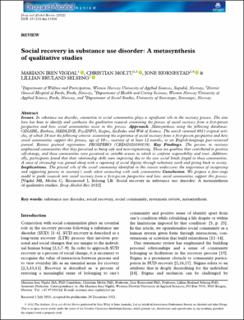| dc.contributor.author | Vigdal, Mariann Iren | |
| dc.contributor.author | Moltu, Christian | |
| dc.contributor.author | Bjørnestad, Jone Ravndal | |
| dc.contributor.author | Selseng, Lillian Bruland | |
| dc.date.accessioned | 2022-03-17T08:44:01Z | |
| dc.date.available | 2022-03-17T08:44:01Z | |
| dc.date.created | 2022-03-07T10:53:07Z | |
| dc.date.issued | 2022 | |
| dc.identifier.citation | Vigdal, M. I., Moltu, C., Bjornestad, J., & Selseng, L. B. (2022). Social recovery in substance use disorder: A metasynthesis of qualitative studies. Drug and Alcohol Review. | en_US |
| dc.identifier.issn | 0959-5236 | |
| dc.identifier.uri | https://hdl.handle.net/11250/2985720 | |
| dc.description.abstract | Issues
In substance use disorder, connection to social communities plays a significant role in the recovery process. The aim here has been to identify and synthesise the qualitative research examining the process of social recovery from a first-person perspective and how social communities assist in this process.
Approach
Metasynthesis using the following databases: CINAHL, Embase, MEDLINE, PsycINFO, Scopus, SocIndex and Web of Science. The search returned 6913 original articles, of which 18 met the following criteria: examining the experience of social recovery from a first-person perspective and how social communities support this process, age of 18+, recovery of at least 12 months, in an English-language peer-reviewed journal. Review protocol registration: PROSPERO (CRD42020190159).
Key Findings
The persons in recovery emphasised communities that they perceived as being safe and non-stigmatising. These are qualities that contributed to positive self-change, and these communities were perceived as suitable arenas in which to confront responsibility and trust. Additionally, participants found that their relationship skills were improving due to the new social bonds forged in these communities. A sense of citizenship was gained along with a regaining of social dignity through voluntary work and giving back to society.
Implications
The pivotal role of the social community identified in this review underscores the importance of recognising and supporting persons in recovery's needs when connecting with such communities
Conclusion
We propose a four-stage model to guide research into social recovery from a first-person perspective and how social communities support this process. | en_US |
| dc.language.iso | eng | en_US |
| dc.publisher | Wiley | en_US |
| dc.rights | Navngivelse 4.0 Internasjonal | * |
| dc.rights.uri | http://creativecommons.org/licenses/by/4.0/deed.no | * |
| dc.title | Social recovery in substance use disorder: A metasynthesis of qualitative studies | en_US |
| dc.type | Peer reviewed | en_US |
| dc.type | Journal article | en_US |
| dc.description.version | publishedVersion | en_US |
| dc.rights.holder | © 2022 The Authors. | en_US |
| dc.source.journal | Drug and Alcohol Review | en_US |
| dc.identifier.doi | 10.1111/dar.13434 | |
| dc.identifier.cristin | 2007970 | |
| cristin.ispublished | true | |
| cristin.fulltext | original | |
| cristin.qualitycode | 1 | |

